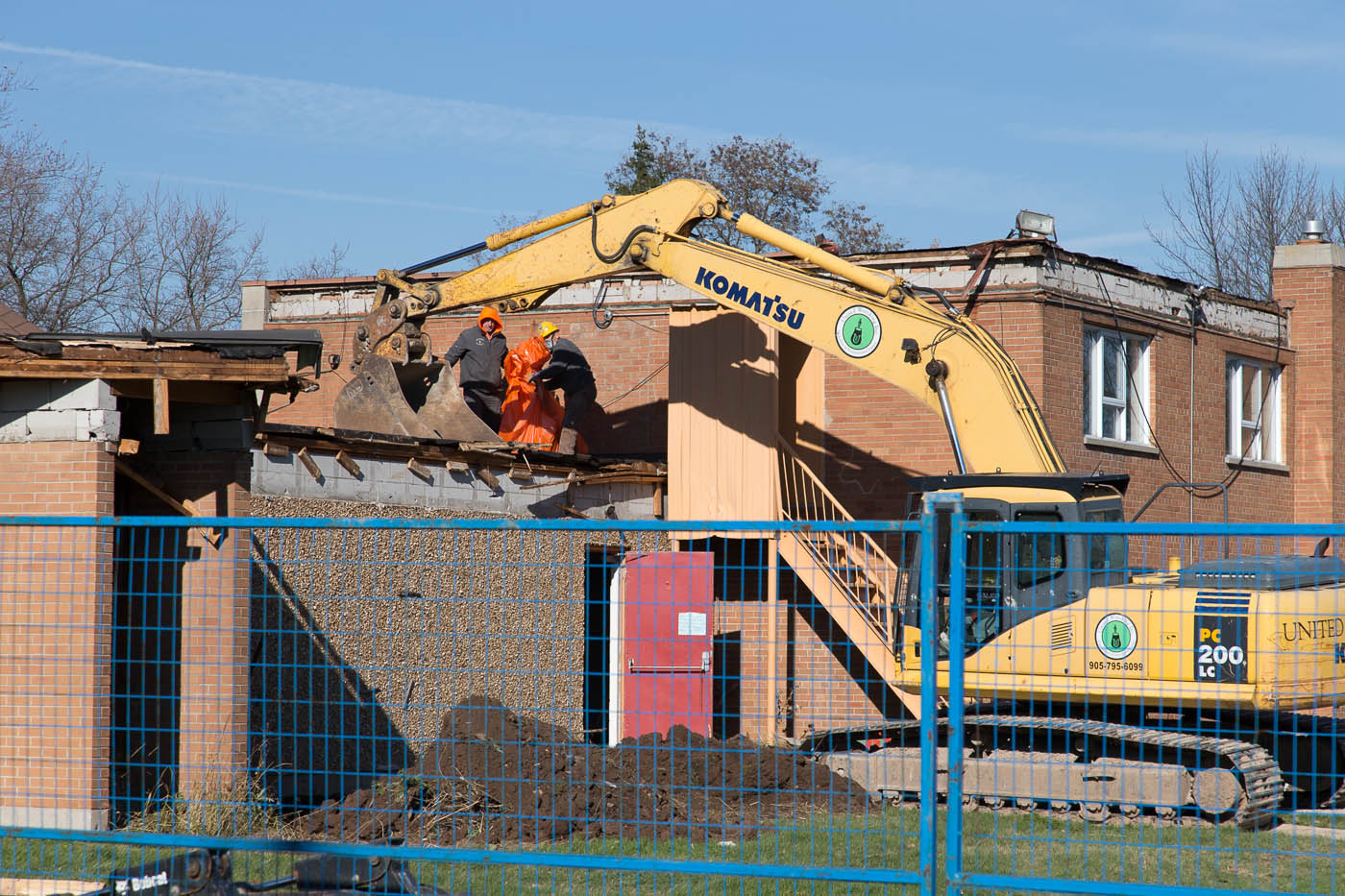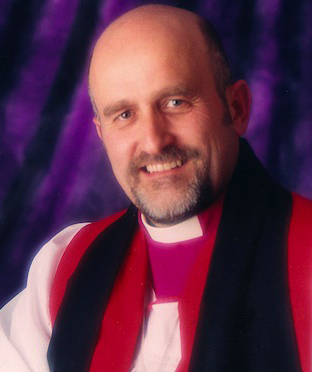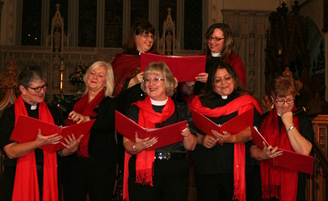St. Hilda’s Easter sunrise service on Lake Ontario. There wasn’t much sun:
Toronto in the distance:
Meanwhile, by 7:00 a.m. global warming had struck Oakville – snow on April 5th!

A song I wrote for Easter Sunday – we will be singing it this morning:
A special announcement from the Truth and Reconciliation Commission of the Anglican Church of Canada.
As we all know, the Anglican Church of Canada is committed to healing and reconciliation with those it wronged 70 years ago. It is now taking the radical step of seeking healing – deep healing in the words of the Primate – for the legacy of lawsuits launched against wayward congregations that had the nerve – the temerity – to defy, yes, I did say defy – the reigning ecclesiarchy to depart our Beloved Church for a competing organisation that made the audacious claim to be Christian. As if our Beloved Church isn’t.
Parishes may obtain a Parish Action Kit that will contain a Ribbon of Reconciliation; as a gesture of good faith, the ribbon will not be rainbow coloured. And even if it is, no-one will be compelled to accept it unless they want to be identified as a recalcitrant non-reconciler and added to a list that will be sent to Justin Welby.
In this way, the work of truth sharing, healing and reconciliation between those whose buildings have been bulldozed and those who did the bulldozing will be consummated in renewed relationships, mutual understanding, respect and love.
Because, in the end, all you need is love.
Bishop James Njegovan of the diocese of Brandon has announced his retirement.
Last year the diocese took the rather unusual measure of suing the bishop’s son for stealing $350,000 of the diocese’s money. Just as gravity has little to do with the motion of falling objects, so the scandal has nothing to do with the retirement – says the bishop.
In a masterpiece of understatement, Njegovan muses that, for some, this will not be entirely unwelcome news. That is probably why the announcement was made on Palm Sunday: to coincide with the rejoicing.
 From here:
From here:
On Palm Sunday, Bishop James Njegovan of the diocese of Brandon announced in a pastoral letter that effective July 31, 2015, he will be retiring after 13-and-a-half-years of episcopal service.
“For some this announcement may come as a surprise,” he said in the letter. But, he added, without elaborating, that for others “as much as I may regret it—it will not be entirely unwelcome news.”
In an interview with the Anglican Journal, Njegovan said there was no connection between his decision to retire and the diocesan lawsuit currently underway involving his son, Noah Njegovan. Bishop Njegovan’s episcopacy has faced challenges in the last two years since his son was charged with fraud for his alleged use of a diocesan business credit card for personal expenses during his time as diocesan archdeacon from 2009 to 2012. Although the Crown withdrew its charges against Noah Njegovan in 2014, the diocese subsequently launched a $350,000 civil lawsuit against him, claiming damages of $250,000 for fraud, breach of trust, breach of contract and fraudulent misrepresentation, and $100,000 for punitive and exemplary damages. The bishop has refrained from involvement or comment on the case, citing his personal relationship with his son.
From here:
We, a group of Anglican Bishops from dioceses across our global Communion greet our sisters and brothers in Christ throughout the Anglican Communion on this most Holy Day, Good Friday. On this day, when our Saviour poured out his very life for the world, we share the following statement in a spirit of sacrificial and reconciling love.
“The covetous desires of people and nations to possess what is not their own, Father, forgive. The greed which exploits the work of human hands and lays waste the earth, Father, forgive.”
At this time of unprecedented climate crisis, we call all our brothers and sisters in the Anglican Communion to join us in prayer and in pastoral, priestly and prophetic action.
This bit is interesting (my emphasis):
We believe that the problem is spiritual as well as economic, scientific and political, because the roadblock to effective action relates to basic existential issues of how human life is framed and valued: including the competing moral claims of present and future generations, human versus non-human interests, and how the lifestyle of wealthy countries is to be balanced against the basic needs of the developing world.
Setting non-human interests above or equal to human interests is typical of the green movement. Animal life, plant life and the earth itself are valued above mankind. Since the villain is fossil fuels and since fossil fuels are largely responsible for most of the benefits of civilisation enjoyed by those, including the bishops, in developed and developing countries, I am convinced that at its root, this is a death-wish neurosis, a lemming-like suicide impulse, the ultimate sacrifice to a Gaia god. In other words, Western Anglicanism at its worst.
Canada was represented at these neo-druid deliberations by Earth Mother Bishop Jane Alexander and Smudging Bishop Mark MacDonald.
A song I wrote a little while ago for Lent:
 When the lady priests in the Diocese of Niagara performed the Vagina Monologues in the diocesan cathedral for the edification – or titillation – of prurient Anglicans, they probably didn’t anticipate that their impetuous attempt to be trendy would, within a couple of years, be condemned as “inherently reductionist and exclusive”. The problem is, it seems, today, not everyone who claims – or self identifies, to use the current in vogue jargon – to be a woman has a vagina. I can’t think why this did not occur to the lady priests.
When the lady priests in the Diocese of Niagara performed the Vagina Monologues in the diocesan cathedral for the edification – or titillation – of prurient Anglicans, they probably didn’t anticipate that their impetuous attempt to be trendy would, within a couple of years, be condemned as “inherently reductionist and exclusive”. The problem is, it seems, today, not everyone who claims – or self identifies, to use the current in vogue jargon – to be a woman has a vagina. I can’t think why this did not occur to the lady priests.
Such are the perils of the never ending quest for ecclesiastical relevance.
From here:
“Gender is a wide and varied experience, one that cannot one that cannot simply be reduced to biological or anatomical distinctions, and many of us who have participated in the show have grown increasingly uncomfortable presenting material that is inherently reductionist and exclusive.”
Ensler’s play, which debuted in 1996 and has added new scenes ever since, features in-your-face monologues about sexual discovery, homosexuality, rape and even pedophilia. But even now, most of these fiercely feminist monologues have yet to give a voice to the vagina-less.
In Katharine Jefferts Schori’s Easter missive, the message of Jesus’ Resurrection is like the seed scattered among the thorns: it is choked by weeds – green weeds.
In reading her Easter guide to spring planting, I remain uncertain as to whether or not the gardener is Jesus. I note the lack of a capital “G”. He himself is planted and then spring[s] up green, so my abiding suspicion is that this is nothing other than a roundabout way of encouraging churches to enhance their electrical plant by installing more rooftop solar panels.
Meaning does occasionally struggle defiantly to raise its head in this epistle, but it is ruthlessly suppressed by the keen mind of the Presiding Bishop.
You can read the whole panegyric to Easter shrubbery here:
She peers in once more – who are these, so bold appearing? “Fear not, woman… why do you weep?” She turns away and meets another, who says the same – why do you weep, who are you looking for? This gardener has himself been planted and now springs up green and vibrant, still rising into greater life. He challenges her to go and share that rising, great news of green and life, with those who have fled.
Still rising, still seeking union with Creator, making tender offering to beloved friends – briefly I am with you, I am on my way. Go and you will find me if you look.
The risen one still offers life to those who will look for evidence of his gardening – hope, friendship, healing, reunion, restoration – to all who have been uprooted, cut off, to those who are parched and withered, to those who lie wasting in the desert. Why do we weep or run away when that promise abides?
We can find that green one, still rising, if we will go stand with the grieving Marys of this world, if we will draw out the terrified who have retreated to their holes, if we will walk the Emmaus road with the lost and confused, if we will search out the hungry in the neighborhood called Galilee. We will find him already there before us, bringing new and verdant life. The only place we will not find him is in the tomb.
A song I wrote a few years ago, loosely based on Psalm 103:
One of the most elegant punishments God visits on his rebellious people is to allow them to have what they want. The Anglican Church of Canada loves nothing better than to fulminate against the evil of fossil fuels, in particular the Athabasca oil sands. The collapse of oil prices has made oil extraction from the sands less attractive, leading to the loss of around a 1000 jobs.
From here:
While the dramatic downturn in oil prices that has occurred over the past six months has had a wide-ranging impact on economic prospects across Canada, those who have been hit hardest are people who were already on the margins, according to the Rev. Dale Neufeld, priest-in-charge of the parish of Fort McMurray, Alta.
[……]
Some of these layoffs have been quite dramatic. Last week the Financial Post reported that 1,000 construction workers had been laid off from Husky Energy’s Sunrise oil sands project near Fort McMurray. Suncor Energy said earlier this year that they, too, would be laying off around 1,000 workers, and Royal Dutch Shell is cutting around 300.
[……]
The church’s response has largely been pastoral.
Since the church has worked so tirelessly to undermine the oil sands, the only pastoral response that has any integrity would be for it to financially support those laid off. Assuming, of course, that the Anglican Church of Canada has any remaining vestige of integrity.